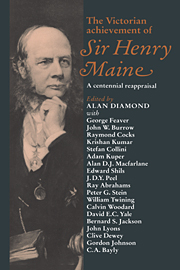Book contents
- Frontmatter
- Contents
- Notes on contributors
- Foreword by Sir John Lyons
- Introduction
- 1 The Victorian values of Sir Henry Maine
- PART 1 MAINE AND THE IDEA OF PROGRESS
- PART 2 MAINE AND THE SOCIAL SCIENCES
- PART 3 MAINE ON LAW, LEGAL CHANGE AND LEGAL EDUCATION
- 11 Maine and legal education
- 12 Maine and legal education: a comment
- 13 A wake (or awakening?) for historical jurisprudence
- 14 Further thoughts on Maine's historical jurisprudence
- 15 Fictions, equity and legislation: Maine's three agencies of legal change
- 16 Law and language: a metaphor in Maine, a model for his successors?
- 17 Linguistics and law: the legacy of Sir Henry Maine
- PART 4 MAINE AND INDIA
- Appendix: the conference programme
- Bibliography
- Index
15 - Fictions, equity and legislation: Maine's three agencies of legal change
Published online by Cambridge University Press: 04 September 2009
- Frontmatter
- Contents
- Notes on contributors
- Foreword by Sir John Lyons
- Introduction
- 1 The Victorian values of Sir Henry Maine
- PART 1 MAINE AND THE IDEA OF PROGRESS
- PART 2 MAINE AND THE SOCIAL SCIENCES
- PART 3 MAINE ON LAW, LEGAL CHANGE AND LEGAL EDUCATION
- 11 Maine and legal education
- 12 Maine and legal education: a comment
- 13 A wake (or awakening?) for historical jurisprudence
- 14 Further thoughts on Maine's historical jurisprudence
- 15 Fictions, equity and legislation: Maine's three agencies of legal change
- 16 Law and language: a metaphor in Maine, a model for his successors?
- 17 Linguistics and law: the legacy of Sir Henry Maine
- PART 4 MAINE AND INDIA
- Appendix: the conference programme
- Bibliography
- Index
Summary
Maine's great contribution to the study of legal change is his identification of fictions, equity and legislation as the mechanisms by which law is brought into harmony with changing social conditions. Maine was clearly not the first person to recognize the utility of these mechanisms, but his crisp formulation remains memorable, and the evolutionary twist which he gave to this scheme has proved to be fruitfully controversial.
The first three chapters of Ancient Law are concerned with the evolution of legal systems. According to Maine, all societies (or at any rate, what he referred to as the Indo-European societies) evolve from a stage at which there is virtually no rule of law at all, where men are subject only to the caprice of ‘the patriarchal despotism’ (AL: 8), to an ‘epoch of Customary Law, and of its custody by a privileged order’ (13). From there, ‘We arrive at the era of Codes, those ancient codes of which the Twelve Tables of Rome were the most famous specimen’ (14). With the adoption of a code, which according to Maine was simply the embodiment in words of the existing customs, the ‘spontaneous development’ of law comes to an end (21). It is with the coming of the epoch of codes that ‘the distinction between stationary and progressive societies begins to make itself felt’ (22).
- Type
- Chapter
- Information
- The Victorian Achievement of Sir Henry MaineA Centennial Reappraisal, pp. 242 - 255Publisher: Cambridge University PressPrint publication year: 1991
- 4
- Cited by

